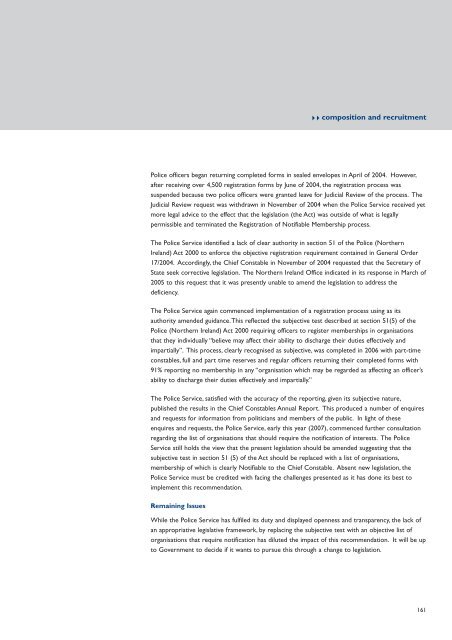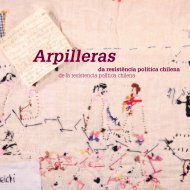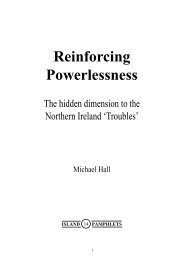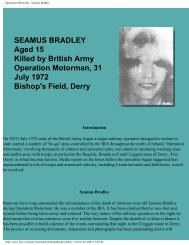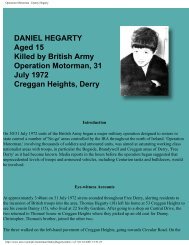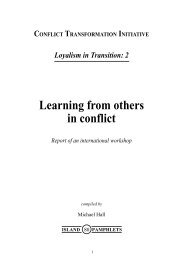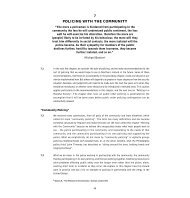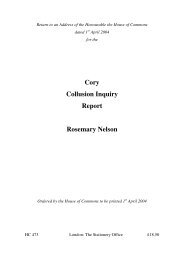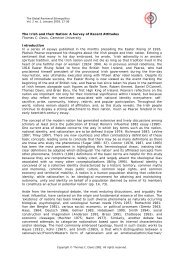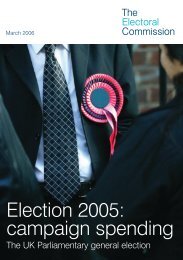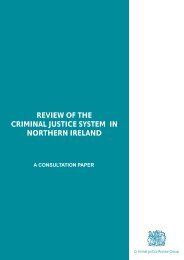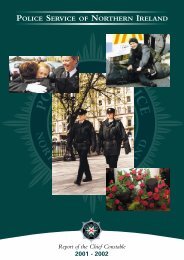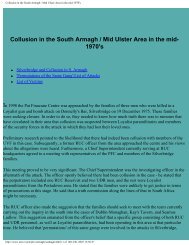11293 report 19 - CAIN - University of Ulster
11293 report 19 - CAIN - University of Ulster
11293 report 19 - CAIN - University of Ulster
You also want an ePaper? Increase the reach of your titles
YUMPU automatically turns print PDFs into web optimized ePapers that Google loves.
composition and recruitmentPolice <strong>of</strong>ficers began returning completed forms in sealed envelopes in April <strong>of</strong> 2004. However,after receiving over 4,500 registration forms by June <strong>of</strong> 2004, the registration process wassuspended because two police <strong>of</strong>ficers were granted leave for Judicial Review <strong>of</strong> the process. TheJudicial Review request was withdrawn in November <strong>of</strong> 2004 when the Police Service received yetmore legal advice to the effect that the legislation (the Act) was outside <strong>of</strong> what is legallypermissible and terminated the Registration <strong>of</strong> Notifiable Membership process.The Police Service identified a lack <strong>of</strong> clear authority in section 51 <strong>of</strong> the Police (NorthernIreland) Act 2000 to enforce the objective registration requirement contained in General Order17/2004. Accordingly, the Chief Constable in November <strong>of</strong> 2004 requested that the Secretary <strong>of</strong>State seek corrective legislation. The Northern Ireland Office indicated in its response in March <strong>of</strong>2005 to this request that it was presently unable to amend the legislation to address thedeficiency.The Police Service again commenced implementation <strong>of</strong> a registration process using as itsauthority amended guidance.This reflected the subjective test described at section 51(5) <strong>of</strong> thePolice (Northern Ireland) Act 2000 requiring <strong>of</strong>ficers to register memberships in organisationsthat they individually “believe may affect their ability to discharge their duties effectively andimpartially”. This process, clearly recognised as subjective, was completed in 2006 with part-timeconstables, full and part time reserves and regular <strong>of</strong>ficers returning their completed forms with91% <strong>report</strong>ing no membership in any “organisation which may be regarded as affecting an <strong>of</strong>ficer’sability to discharge their duties effectively and impartially.”The Police Service, satisfied with the accuracy <strong>of</strong> the <strong>report</strong>ing, given its subjective nature,published the results in the Chief Constables Annual Report. This produced a number <strong>of</strong> enquiresand requests for information from politicians and members <strong>of</strong> the public. In light <strong>of</strong> theseenquires and requests, the Police Service, early this year (2007), commenced further consultationregarding the list <strong>of</strong> organisations that should require the notification <strong>of</strong> interests. The PoliceService still holds the view that the present legislation should be amended suggesting that thesubjective test in section 51 (5) <strong>of</strong> the Act should be replaced with a list <strong>of</strong> organisations,membership <strong>of</strong> which is clearly Notifiable to the Chief Constable. Absent new legislation, thePolice Service must be credited with facing the challenges presented as it has done its best toimplement this recommendation.Remaining IssuesWhile the Police Service has fulfiled its duty and displayed openness and transparency, the lack <strong>of</strong>an appropriative legislative framework, by replacing the subjective test with an objective list <strong>of</strong>organisations that require notification has diluted the impact <strong>of</strong> this recommendation. It will be upto Government to decide if it wants to pursue this through a change to legislation.161


